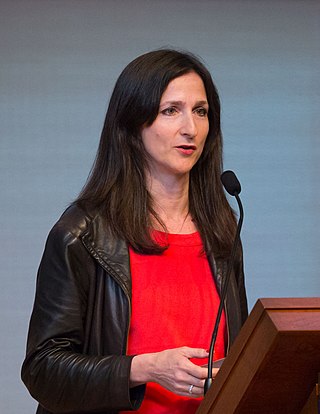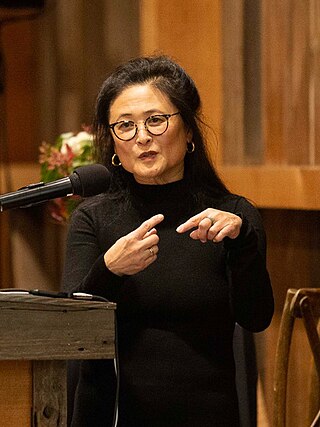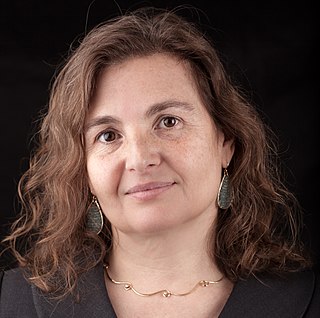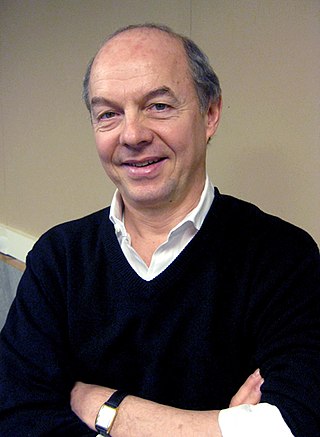
A satellite constellation is a group of artificial satellites working together as a system. Unlike a single satellite, a constellation can provide permanent global or near-global coverage, such that at any time everywhere on Earth at least one satellite is visible. Satellites are typically placed in sets of complementary orbital planes and connect to globally distributed ground stations. They may also use inter-satellite communication.

Joichi "Joi" Ito is a Japanese entrepreneur and venture capitalist. He is the President of Chiba Institute of Technology. He is a former director of the MIT Media Lab, former professor of the practice of media arts and sciences at MIT, and a former visiting professor of practice at Harvard Law School. Ito has received recognition for his role as an entrepreneur focused on Internet and technology companies and has founded, among other companies, PSINet Japan, Digital Garage, and Infoseek Japan. Ito is general partner of Neoteny Labs, and former board member of Creative Commons, The Electronic Privacy Information Center (EPIC), The Internet Corporation for Assigned Names and Numbers (ICANN), John S. and James L. Knight Foundation, The New York Times Company, John D. and Catherine T. MacArthur Foundation, The Mozilla Foundation, The Open Source Initiative, and Sony Corporation. Ito wrote a monthly column in the Ideas section of Wired.

Katie Salen Tekinbaş is an American game designer, animator, and educator. She is a professor at the University of California, Irvine. Previously, she taught at DePaul University College of Computing and Digital Media, Parsons The New School for Design the University of Texas at Austin, New York University, and the Rhode Island School of Design. She has an MFA in graphic design from the Rhode Island School of Design.

Digitality is used to mean the condition of living in a digital culture, derived from Nicholas Negroponte's book Being Digital in analogy with modernity and post-modernity.

Henry Guy Jenkins III is an American media scholar and Provost Professor of Communication, Journalism, and Cinematic Arts, a joint professorship at the University of Southern California (USC) Annenberg School for Communication and Journalism and the USC School of Cinematic Arts. He also has a joint faculty appointment with the USC Rossier School of Education. Previously, Jenkins was the Peter de Florez Professor of Humanities as well as co-founder and co-director of the Comparative Media Studies program at the Massachusetts Institute of Technology (MIT). He has also served on the technical advisory board at ZeniMax Media, parent company of video game publisher Bethesda Softworks. In 2013, he was appointed to the board that selects the prestigious Peabody Award winners.

Mizuko Itō, sometimes known as Mimi Ito, is a Japanese cultural anthropologist and learning scientist. She is Professor in Residence and John D. and Catherine T. MacArthur Chair in Digital Media and Learning, and Director of the Connected Learning Lab in the Department of Informatics, Donald Bren School of Information and Computer Sciences at the University of California, Irvine. Her main professional interest is young people's use of media technology. She has explored the ways in which digital media are changing relationships, identities, and communities.
Amy Smith is an American inventor, educator, and founder of the MIT D-Lab and senior lecturer of mechanical engineering at MIT.

Sara Seager is a Canadian–American astronomer and planetary scientist. She is a professor at the Massachusetts Institute of Technology and is known for her work on extrasolar planets and their atmospheres. She is the author of two textbooks on these topics, and has been recognized for her research by Popular Science, Discover Magazine, Nature, and TIME Magazine. Seager was awarded a MacArthur Fellowship in 2013 citing her theoretical work on detecting chemical signatures on exoplanet atmospheres and developing low-cost space observatories to observe planetary transits.

danah boyd is an American technology and social media scholar. She is a partner researcher at Microsoft Research, the founder of Data & Society Research Institute, and a distinguished visiting professor at Georgetown University.
The MIT School of Humanities, Arts, and Social Sciences (SHASS) is one of the five schools of the Massachusetts Institute of Technology, located in Cambridge, Massachusetts, US. The school includes 11 academic areas and works alongside six departments, labs, and programs. SHASS grants SB, SM, and PhD degrees. Major fields of study include anthropology, comparative media studies and writing, economics, history, linguistics, literature, music, philosophy, political science, science, technology, and society, and theater arts. Other programs include the Center for International Studies; Knight Science Journalism; Science, Technology, and Society; Security Studies; and HyperStudio.

The MIT School of Architecture and Planning is one of the five schools of the Massachusetts Institute of Technology in Cambridge, Massachusetts. Founded in 1865 by William Robert Ware, the school offered the first architecture curriculum in the United States and was the first architecture program established within a university. MIT's Department of Architecture has consistently ranked among the top architecture/built environment schools in the world.

Lisa Lowe is Samuel Knight Professor of American Studies at Yale University, and an affiliate faculty in the programs in Ethnicity, Race, and Migration and Women's, Gender, and Sexuality Studies. Prior to Yale, she taught at the University of California, San Diego, and Tufts University. She began as a scholar of French and comparative literature, and since then her work has focused on the cultural politics of colonialism, immigration, and globalization. She is known especially for scholarship on French, British, and United States colonialisms, Asian migration and Asian American studies, race and liberalism, and comparative empires.

Daniela L. Rus is a roboticist and computer scientist, Director of the MIT Computer Science and Artificial Intelligence Laboratory (CSAIL), and the Andrew and Erna Viterbi Professor in the Department of Electrical Engineering and Computer Science (EECS) at the Massachusetts Institute of Technology. She is the author of the books Computing the Future and The Heart and the Chip.

Jing Wang was Professor of Chinese media and Cultural Studies and S.C. Fang Professor of Chinese Language & Culture at Massachusetts Institute of Technology. She was jointly appointed to MIT's Comparative Media Studies and Global Studies & Languages.
Caren Kaplan is professor emerita of American Studies at University of California at Davis, and a figure in the academic discipline of women's studies. Together with Inderpal Grewal, Kaplan has worked as a founder of the field of transnational feminist cultural studies or transnational feminism.

William Charles Uricchio is an American media scholar and Professor of Comparative Media Studies at the Massachusetts Institute of Technology and Professor of Comparative Media History at Utrecht University in the Netherlands. Together with Henry Jenkins, he helped to build and direct MIT's Comparative Media Studies program. Uricchio was Principal Investigator of the Singapore-MIT GAMBIT Game Lab. He is founder and Principal Investigator of the MIT Open Documentary Lab. He is also (co-)author or (co-)editor of several books including We Europeans? Media, Representations, Identity; Media Cultures; Die Anfänge des deutschen Fernsehens: Kritische Annäherungen an die Entwicklung bis 1945; Reframing Culture: The Case of the Vitagraph Quality Films; The Many Lives of the Batman: Critical Approaches to a Superhero and his Media; and Many More Lives of the Batman. Uricchio is series editor of the MIT Press Playful Thinking Series on game related topics.
Richard Arthur Grusin is an American new media scholar and author. Grusin is a Professor of English at the University of Wisconsin–Milwaukee, and former Director of the Center for 21st Century Studies.
Amy Nadya Finkelstein is an American economist who is a professor of economics at the Massachusetts Institute of Technology (MIT), the co-director and research associate of the Public Economics Program at the National Bureau of Economic Research, and the co-Scientific Director of J-PAL North America. She was awarded the 2012 John Bates Clark Medal for her contributions to economics. She was elected to the National Academy of Sciences and won a MacArthur "Genius" fellowship in 2018.

Moriba Kemessia Jah CorrFRSE is an American space scientist and aerospace engineer who describes himself as a "space environmentalist", specializing in orbit determination and prediction, especially as related to space situational awareness and space traffic monitoring. He is currently an associate professor of Aerospace Engineering and Engineering Mechanics at the University of Texas at Austin. Jah previously worked as a spacecraft navigator at the NASA Jet Propulsion Laboratory, where he was a navigator for the Mars Global Surveyor, Mars Odyssey, Mars Express, Mars Exploration Rover, and his last mission was the Mars Reconnaissance Orbiter. He is a Fellow of the American Astronautical Society, the Air Force Research Laboratory, the International Association for the Advancement of Space Safety and, the Royal Astronomical Society. Jah was also selected into the 10th anniversary class of TED Fellows and was named a MacArthur Fellow in 2022. He also was selected into the AIAA class of Fellows and Honorary Fellows in the year of the 50th Anniversary of Apollo 11. The AIAA "confers the distinction of Fellow upon individuals in recognition of their notable and valuable contributions to the arts, sciences or technology of aeronautics and astronautics."














